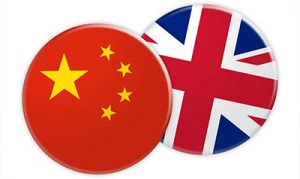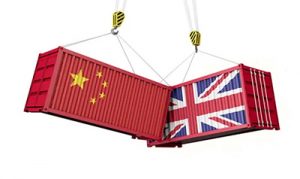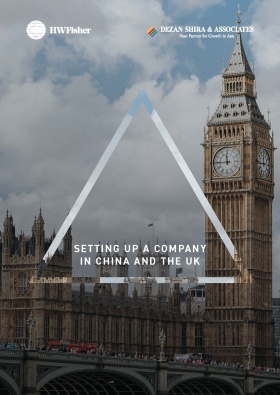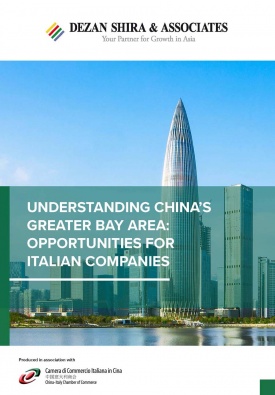UK Foreign Secretary Talks Up UK-China Trade and Investment
Opportunities for UK plc as China’s middle-class consumer market is set to reach 800 million by 2035.
After several years of hawkish British attitudes towards anything Chinese, the UK Foreign Secretary, James Cleverly, has trimmed the wings of British ‘wolf warriors’ and effectively stated that without engaging with China, the UK won’t get anywhere. That won’t please certain circles in London; however, reality bites – the British Government needs its own companies to be healthy and operational in China in order to bring home taxable fiscal income from Asia.
That recognition finally dawned after it became glaringly apparent that the recent UK-CPTPP free trade agreement would not be sufficient to replace China. As I pointed out three weeks ago, French President Emmanuel Macron’s visit generated more revenue for Bae Systems in just one Airbus deal with Xi Jinping – far more than the CPTPP is ever capable of doing. Such is the magnitude of China’s trade opportunity.
Cleverly provided historical background in the UK’s new China Policy address, titled ‘Our Policy On China’ in which he outlined Chinese contribution to inventions and trade dating back over 2,000 years. A pragmatic reality set in when he said, “In a nation that encompasses a fifth of all humanity, and a vast area almost as large as continental Europe from the Atlantic to the Urals…no plausible adjective can do justice to such a country or to any sensible approach towards it,” which basically states the obvious but also indicates that the UK requires a better-balanced approach to dealing with Beijing.
Recent UK-China cooperation

Cleverly then discussed a wide range of global issues that he said the UK and China would be better off working together upon, citing as just one example, that British research convinced the Chinese agriculture ministry to act against the danger of antibiotic resistance by restricting colistin, an antibiotic used in animal feed. Sales subsequently fell by 90 percent, making everyone in the world less prone to antibiotic resistance.
He then moved to trade, including the fact that British companies secured deals worth £600 million for UK institutions to launch fund management companies in China – an issue related in fact to the repositioning of Hong Kong as a financial services hub for China under the various ‘Wealth Management Connect’ schemes and part of the Greater Bay Area concept, which I discuss later in this article.
Cleverly also introduced financial incentives of sorts, heralding the building of a new British Embassy in Beijing and ‘doubling our funding for China capabilities across Government’ – whatever that means.
Security

Naturally, he also touched upon security issues, with the line “we don’t want the long arm of the Chinese Communist Party reaching towards the central nervous system of our country” while also mentioning issues concerning the Uyghurs, Taiwan, and the Aukus security agreement. For an analysis of those, the Beijing to Britain blog is the place to go for more China hawkish and security-related issues. It is available for £10 and will excite the China-dubious; however, it doesn’t focus on trade or opportunity intelligence.
The UK-China opportunity

Politics aside, it is also important to understand why China should be a highly profitable market for British investors. The success or failure of this isn’t created by a magic wand or a tap that can be turned on and off; it also depends upon China’s own internal development and growth policies and where China sees itself going. That also requires policy architecture and a regulatory and trade system to support this. In fact, Beijing has been very open about where it sees future opportunities – including for foreign investors. These can largely be described as follows:
The Dual Circulation Strategy
The ‘Dual Circulation Strategy’ is a Chinese State policy that dictates that Beijing wishes to develop two, concurrent policy avenues at the same time. These are to increase Chinese exports alongside boosting Chinese domestic consumerism. I detail these as follows:
Chinese exports
China has been massively increasing its export base over the past decade, most notably by developing the Belt & Road Initiative, partially because this has a positive impact on China’s GDP and also because it diversifies its customer base away from potentially problematic trade partners, such as the United States. Readers will recall the 2018-19 US-China ‘tariff wars’ – many of whose resulting high tariffs for Chinese imports remain in place. China’s exports have maintained a healthy trade with these increasing by 7 percent in 2022 to reach about US$3.59 trillion dollars and a globally wide-ranging customer base.
Chinese consumerism
It is Chinese state policy to continue to lift the average Chinese national to middle-class status and out of poverty, an issue that Cleverly referred to in his speech, saying that “China has achieved the biggest and fastest economic expansion the world has ever known. No less than 800 million people have lifted themselves out of poverty.”
In fact, China’s middle-class base and its continuing development and expansion were referred to in last October’s CPC Congress and set out as a specific goal the growth of Chinese consumerism for the period 2023-2035 – a twelve-year consumer development strategy window for the UK (and other) foreign investors.
In terms of contemporary statistics, according to statements made by China National Bureau of Statistics Commissioner Ning Jizhe in January 2022, China has more than 400 million middle-income earners, or 140 million families, as part of its 1.4 billion population. These existing middle-income earners are already a group larger than the total population of the United States and are seen as key for the world’s second-largest economy to refer to the domestic market for future growth.
China doesn’t provide an official definition of its middle-income group, as income levels vary considerably across the country. However, according to Ning, a typical Chinese family of three earns between RMB 100,000 and 500,000 per annum – in US dollar terms between US$14,000-70,000 a year.
However, it should be noted that in primary cities – China has 20 cities with populations in excess of 5 million, and over 50 with populations bigger than Manchester or Birmingham – the average income will be far higher. Numerous Chinese staff within Dezan Shira & Associates offices in Beijing and Shanghai for example earn more than US$75,000 per annum. With both parents typically working and children looked after by Mum, that combined annual household income now often exceeds typical Western levels in many cities.
But Beijing has plans beyond these already impressive figures. Research conducted by the CPPCC – Beijing’s top political advisory body – late last year indicated that another 300 to 400 million people from China’s population have the potential to join this middle-income group and are based primarily in the private sector.
Over 400 million people worked for private firms or self-employed businesses in China in 2022, while the private sector contributed to over 60 percent of China’s GDP. It is this sector that the CPC is additionally and continuing to target as a key driver in China’s wealth creation. It is relevant for foreign investment and export interests that the new CPC policy is to more than double China’s middle-class domestic consumption in the next 12 years to 2035. That means a middle-class population of 800 million in China is currently being developed – and it is state policy to ensure this happens. The potential for UK manufacturing exporters is enormous. There is more on this policy in this article here.
Hong Kong is back – the development of the Greater Bay Area

Of note to the UK’s financial services industry is the development of the Greater Bay Area which includes Hong Kong, Macao, and all of Guangdong Province. Hong Kong is being repositioned as a ‘Wealth Management’ service center to assist with handling the estimated US$3 trillion in private wealth currently under-managed in mainland China.
Hong Kong has specific trade and financial services agreements with mainland China (the ‘One Country-Two Systems’ concept remains in place with differing tax and tariff rates between Hong Kong and China) which have effectively liberalized the financial services industry to foreign investors and allowed them access to mainland funds and private wealth.
These include banking, equities, insurance, and other services, such as swaps and securities.
Our recent complimentary report on the subject can be downloaded for free here.
Suffice to say that the UK’s financial services sector and professionals within this should be looking to beating a path back to Hong Kong and examining where professional skills and services in the financial services arena can position themselves to take advantage and service China’s US$3 trillion opportunity. Interestingly, Hong Kong just this past week passed legislation permitting ‘family offices’ meaning that the government has recognized the need to attract back to the city expats that are able to work in Hong Kong but stay attuned to working hours relating to markets in London, Frankfurt, New York and beyond. Hong Kong is bouncing back.
Investing in China and free trade agreements

Although many British companies will be content to service the China market purely by appointing distributors and letting them do the work, those with larger ambitions will ultimately need to establish operations in China and manufacture or part-manufacture there.
Registering a company to do so in China is relatively straightforward but as always, the devil is in the details. Getting trademarks and patents registered, structuring a tax-efficient business and looking at suitable free trade or other economic zones, as well as conducting initial market research are all areas that need to be addressed. Dezan Shira & Associate’s 2023 Guide to Doing Business In China answers most of these questions and is a complimentary download.
However, there are other options and advantages. China has a Free Trade Agreement with ASEAN, which means that goods manufactured in ASEAN can be exported to China – and vice-versa. With Vietnam just across the border, some UK companies may find it easier and politically less troublesome to set up in Vietnam. Or set up in China and export to the ASEAN market as well. The links above contain free reports on these markets.
Also of note is the China-Regional Comprehensive Economic Partnership (RCEP) trade agreement, which also includes ASEAN as well as Australia, New Zealand, Japan, and South Korea. That deal assisted regional China trade with the RCEP nations to grow by an additional 7 percent last year and is a pivotal part of China’s overall East Asian trade reach. UK investors in China, by virtue of being a Chinese-registered company, can also take advantage of the tariff reductions that the RCEP agreement provides. More details can be found here.
Summary
Much of the UK media has ignored the China trade aspect of Cleverly’s speech – which it appears is now British Government policy – or has remained stuck in the hawkish mode that has dominated the past few years. What Cleverly has done is shift the narrative back towards the middle ground, observing that the UK has legitimate security concerns while at the same time acknowledging that British businesses have a tremendous opportunity to work with China at the same time.
The security hawks and UK wolf warriors will still demand their crust – many have earned rather a lot of money by setting themselves up as part of the anti-China brigade – but the practical reality is that the UK needs to trade. Generating profits from selling to China especially is a real opportunity – and to paraphrase the old saying: ‘800 million People Can’t Be Wrong’.
Also read
China Briefing is published by Dezan Shira & Associates. The firm has over 30 years of experience and 13 offices in China and assists foreign investors in the China market. For assistance please email us at china@dezshira.com
- Previous Article Die Beziehungen zwischen der EU und China – Handel, Investitionen und jüngste Entwicklungen
- Next Article How Will the EU Carbon Border Adjustment Mechanism Impact China Businesses?







